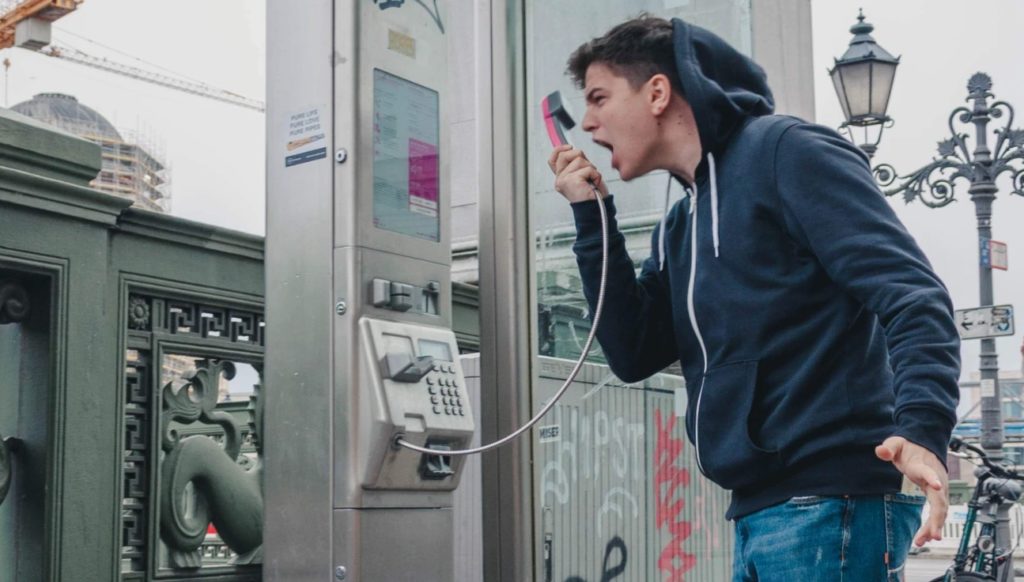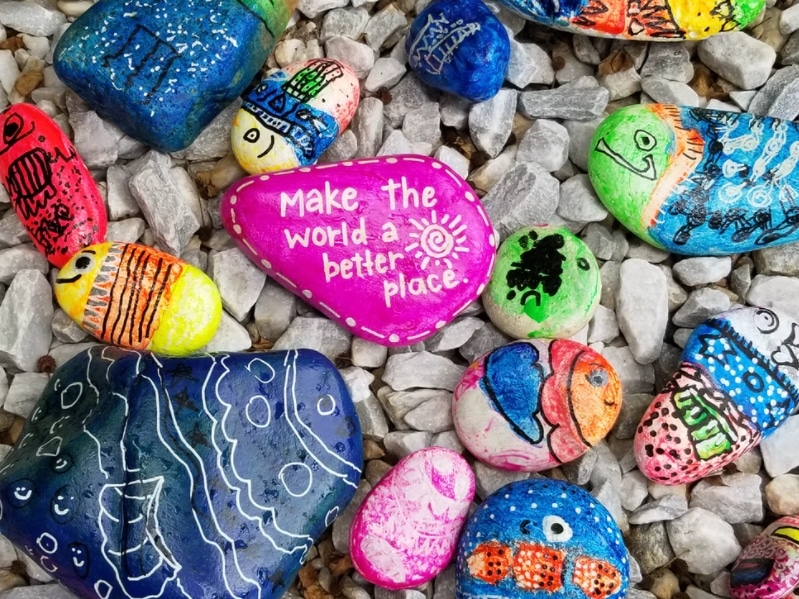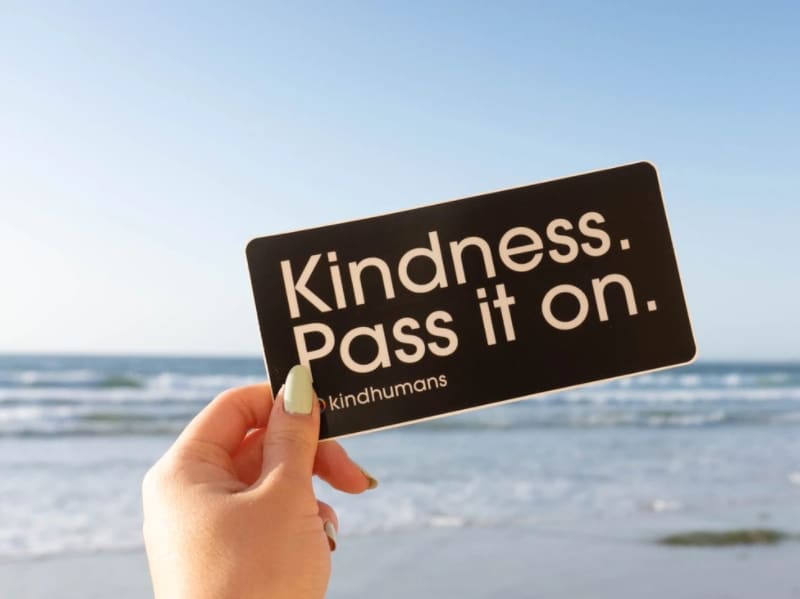Choosing kindness doesn’t come easy to us. We are wired in a way that makes it much easier for us to react to something in a negative way. But does that mean that we should never try to choose kindness over negativity? Hell no!
This article discusses why we find it so difficult to choose kindness and explains the biases to cause our negative behavior. I’m going to show you why it’s so difficult to choose kindness, and explain how you can change your actions to be more kind, compassionate, forgiving, and positive. There are 3 huge benefits to choosing kindness, that will convince you why it’s better to always be kind to those around you.
If you want to learn more about this, then you’re in the right place. After reading this article, you’ll know when and how to be more kind to others, whenever you have the chance.
Contents
When is choosing kindness a choice?
There are many times when you can choose to be kind. What you decide to do depends on who you are, and how aware you are of those situations.
It also can depend on how you woke up, or how you’re personally feeling. Depending on how you feel, you could choose to be a jackass or you can choose to be kind.
These situations pop up multiple times per day, often without us being aware of them. If you commuted to work today, there’s a chance that some person cut you off, or did something stupid in traffic that you had to correct.
What would you do? Show him the middle finger? Scream at him and call him an asshole? Or would you just wave at him with a smile?
It’s easy to choose the opposite of kindness
Most humans want justice to be served in the world. It makes sense, right? If someone does something immoral or unlawful, that person needs to be corrected. Right?
If someone cuts me off in traffic, then it’s my duty to open my window and call him an asshole as loud as I can. Right? I can’t let this reckless driver get away with nearly pushing me off my lane?

This would make total sense in a world where humans act like robots.
But that’s not the case. In fact, the minds of humans – all of us, including me and you – are flawed.
One of these flaws in particular is called the fundamental attribution error. This website has a great explanation of what it is (and covers most other flawed human biases as well).
Basically, the fundamental attribution error means that we judge others on their character, but yourselves on the situation.
Let’s put it this way: if you’ve ever done something stupid in traffic, you’ve likely shrugged it off and explained to yourself that it was because of the busy traffic. It wasn’t your fault, and even then, what’s the big deal? No one died.
But when it’s someone else that does it, we are quick to get out our hypothetical pitchforks and torches.
This bias explains a lot about why humans are so often deciding to be the opposite of kind.
When can you actually choose kindness over negativity?
We often choose the opposite of kindness, whether that’s in the form of hate, envy, or negativity.
Here’s an example of what I mean, which I used in another article as well.
I recently saw an overweight man riding a bicycle. The shirt he was wearing was undersized and his pants were a little down. As a result, he showed a massive buttcrack to everyone he passed on the street. According to most standards, this was not a pretty sight. 😅
I was quick to make a jokey comment about it to my girlfriend. “Hey look, he’s probably on his way to the nearest McDrive”, I laughed while sneakily pointing to the man.
My girlfriend quickly pointed out that I have no idea what shit he may be dealing with. And she was 100% right. She reminded me that it’s so easy to judge others for the way they look, dress, behave or appear. But was I really in a position to judge? Hell no, I had no idea what that man might have been dealing with.
Why we need to be aware
Consider the previous example I used: If my girlfriend hadn’t made me aware of my negativity, I would have forgotten about it in a heartbeat and moved on.
But if the whole world chooses negativity over kindness, the world would certainly be a worse place. That’s why it’s incredibly important to become aware of the situations where we have the choice to be kind or not.
As I’ve said, the fundamental attribution error affects us all. If we don’t actively seek out opportunities to be kind, compassionate, or forgiving, we will unconsciously choose to be the opposite of kind.
And that’s how the world becomes a worse place to live in.
Benefits of choosing kindness
There are luckily some strong and significant benefits to choosing kindness, which I will cover here. I hope that these benefits will help you realize how important it is to always choose kindness, whenever we get the chance.
1. Choosing kindness will result in more personal happiness.
Choosing kindness will increase your happiness, and it has been proven by plenty of studies.
For example, this study involved around a hundred participants that were given 5 dollars every day for five days. They were asked to either spend it on themselves or others. But the condition was – they had to spend it on the same thing every day. What would you have done?
Different participants spent the money in different ways. The result showed that the participants who spent it on others instead of themselves experienced more happiness.
There are many more ways to spread happiness, ranging from giving someone a compliment to just providing a listening ear to a friend in need. Funnily enough, all these things have been studied before and the results have shown that spreading happiness like this increases your own happiness as well.
(This phenomenon is often referred to as the “helper’s high”, and it’s one of the strongest reasons why choosing kindness is the best thing to do.)
This benefit should give you enough reason to always choose kindness, but there are more benefits so let’s continue!
2. Your kindness can inspire others to be kind
In high school, my English teacher made the class watch the movie “Pay It Forward”. I didn’t find the movie itself great (it didn’t involve as many explosions or car chases as I liked). But the main message of the movie has stuck with me ever since.
“Paying it forward” comes down to asking a person you’ve been kind to not to return the favor, but instead to repay the kindness to someone else. That way, one simple act of kindness has the power to turn into a larger wave of kindness.
Of course, this doesn’t mean that you have to shout “PAY IT FORWARD” to everyone you share some kindness with. Instead, by not asking for anything in return, the message of “pay it forward” is implied.
That’s the second big benefit of always choosing kindness: your acts of kindness can inspire others to be kind as well. This way, the positive energy of your act of kindness will not end when the kindness is returned. It will live on as your act of kindness spreads from person to person.
There are many studies that show how being around happy people positively influences your own happiness as well. So by inspiring those around you to be more kind as well, you’ll set yourself up for more future happiness!
3. Your kindness can make the world a better and happier place
The last benefit of choosing kindness is a big one.
I recently wrote an article that focused on how to make the world a better place. Many of the things discussed in this article are all about being a kind person. Choosing kindness is one of the best ways to make the world a better place.

But how much influence can you really have, as an individual?
Even though you don’t have the power to single-handedly turn this world into a happy place where we all get along, you do have the power to inspire others.
And your power to inspire others is the key to making the world a better place. Your small acts of kindness are able to inspire others, who will then spread those actions to their friends and family. This snowball will continue to grow, and can eventually have a big impact on the world (with or without your awareness of it).
Don’t forget to be kind to yourself too
With all this said, I want to mention something very important.
You shouldn’t spend all your energy being kind to others when it comes at the cost of your own mental health. Even though I just listed all these benefits of being kind to others, the most important person you should be kind to is yourself.
You can’t pour from an empty cup.
Being too compassionate to others is not good. Spending too much of your own energy on others can result in stress, according to this study.
You don’t want to turn into a people-pleaser.
Instead, here are some tips with links to articles that will help you to be more kind to yourself:
- Respect yourself
- Forgive others but don’t forget to forgive yourself
- Focus on yourself
- Keep a self-care journal
💡 By the way: If you want to start feeling better and more productive, I’ve condensed the information of 100’s of our articles into a 10-step mental health cheat sheet here. 👇
This Cheat Sheet Will Help You Be Happier and More Productive
Thrive under stress and crush your goals with these 10 unique tips for your mental health.
I hope this article has helped you realize just how powerful it is to choose kindness. The real difficulty here is to recognize the situations when we can choose the way we act. By being more self-aware about these situations, we can choose kindness every time and turn the world around us into a more positive place.
What do you think? Are you ready to show the world a kinder version of yourself? Do you want to add another benefit to always being kind? Or a little act of kindness that you love? Let me know in the comments below!


